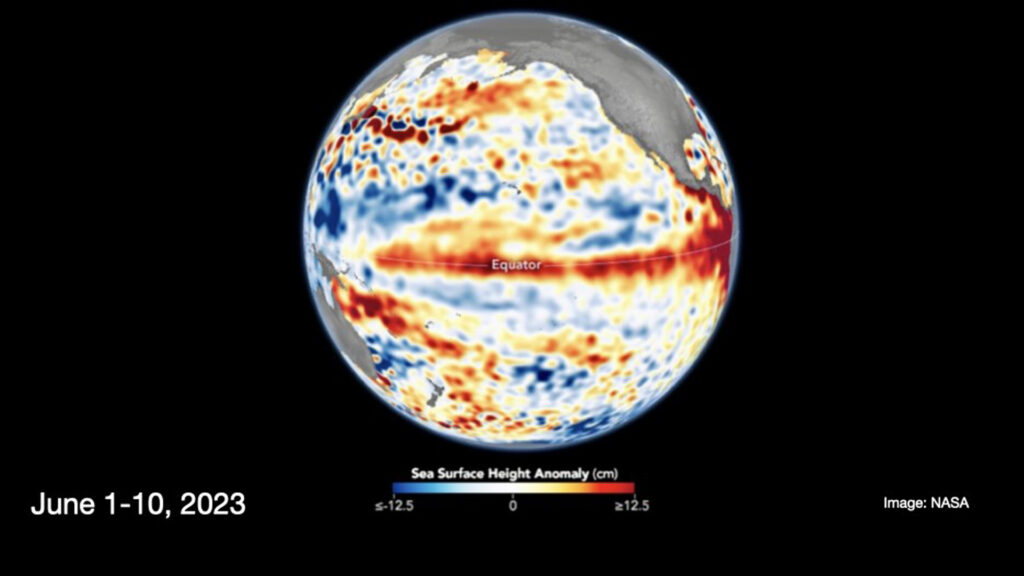By Annie Reisewitz, University of Miami
A new study by scientists at the University of Miami Rosenstiel School of Marine, Atmospheric, and Earth Science identified the El Niño–Southern Oscillation as the primary cause of the spike in global surface temperature in 2023, not human-induced climate change. The rapid rise in global surface temperature in 2023 led to concerns and speculation among the public and media as to the cause.
“Given the pressing nature of the issue, we wanted to thoroughly investigate the primary cause of last year’s spike in temperatures,” said the study’s lead author, Shiv Priyam Raghuraman, who completed the work as a postdoctoral researcher at the Rosenstiel School. “Our experiments showed that when human influences were absent from climate simulations, global warming spikes were still produced.”
The researchers analyzed models that allow the climate to evolve without any influence from human activity to show that there is a 10% chance that a spike in temperatures occurs when an El Niño event was preceded by a long La Niña, as it happened in 2022-2023. Furthermore, nearly all spikes were associated with an El Niño event. The results indicate that the 2023 warming spike was primarily caused from the El Niño–Southern Oscillation, rather than human-induced global warming events.

In 2023, global temperatures reached unprecedented levels, with many regions experiencing extreme heat, which contributed to one of the hottest years on record. The year saw remarkable temperature anomalies, particularly in Europe and parts of the Middle East, where heatwaves brought record highs, often exceeding 40°C (104°F). The oceans also reached higher-than-normal temperatures, resulting in weather extremes such as intense storms and prolonged droughts in various parts of the world.
“This result does not take away from the fact that human emission of greenhouse gases is responsible for the long-term warming trend and that this warming will continue until the net emission of CO2 and other greenhouse gases is brought to zero” said Brian Soden, a co-author of the study and a professor of atmospheric sciences at the Rosenstiel School.
El Niño is a climate phenomenon characterized by the periodic warming of sea surface temperatures in the central and eastern Pacific Ocean. It significantly impacts global weather patterns and can lead to environmental and climatic changes.
Human-induced changes are a significant driver of long-term climate change through the release of greenhouse gases, primarily carbon dioxide and methane, into the atmosphere. Activities such as burning fossil fuels for energy, deforestation and industrial processes have led to a dramatic increase in these gases, trapping heat and resulting in a warming planet. This study notes that ENSO variability against a background human-induced warming trend can lead to year-on-year spikes that are also historical temperature records.
The study, titled “The 2023 global warming spike was driven by the El Niño–Southern Oscillation” was published in the journal Atmospheric Chemistry and Physics. The study’s coauthors include: Shiv Priyam Raghuraman, now an assistant professor at the University of Illinois Urbana-Champaign; Brian Soden and Amy Clement from the Rosenstiel School; and Gabriel Vecchi, Sofia Menemenlis, and Wenchang Yang from Princeton University. The study was supported by the National Oceanic and Atmospheric Administration (grant #NA21OAR4310351).
This piece was originally published at https://news.miami.edu/rosenstiel/stories/2024/10/el-ni%c3%b1o-southern-oscillation-caused-the-spike-in-2023-temperatures-new-study-found.html.
Sign up for The Invading Sea newsletter by visiting here. If you are interested in submitting an opinion piece to The Invading Sea, email Editor Nathan Crabbe at ncrabbe@fau.edu.



